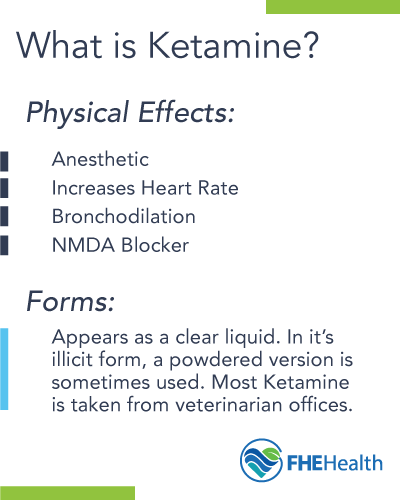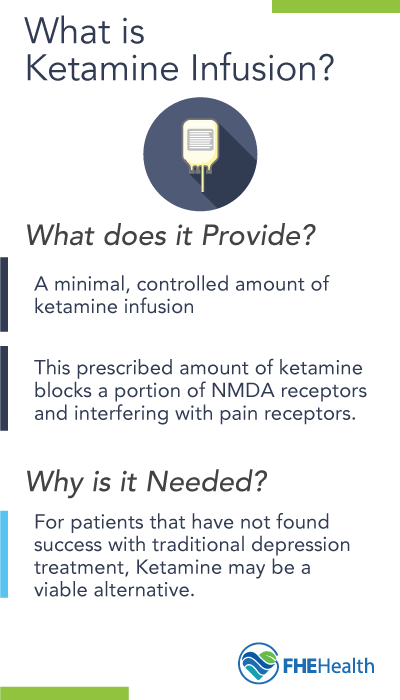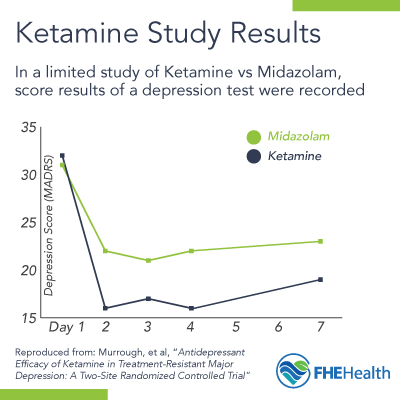
Ketamine is a non-insurance covered benefit that is experimental.
FHE Health is one of few, if not the only treatment center, which combines the diagnostic tools of mental health professionals with Ketamine Infusion treatment in Florida. Our mission is to provide personalized, high-quality care for people suffering from afflictions where ketamine Infusions have proven to be a successful treatment option. We recognize ketamine treatments are only one part of a patients recovery and for a patient to truly be successful we develop an individualized treatment plan which includes a complete psychiatric evaluation to fit your personal needs.
History of Ketamine
An organic chemistry professor working for Parke Davis Laboratories first synthesized ketamine in 1962. Within four short years, ketamine was being patented as an anesthetic for animals and humans. The U.S. Food and Drug Administration, under President Richard Nixon’s administration, approved ketamine as an anesthetic for humans. It was quickly implemented during the Vietnam War as a field anesthetic for American soldiers. In addition, veterinarians began using ketamine as an anesthetic and sedative for domesticated and wild animals.
Ketamine’s psychoactive properties made it a favorite of illegal drug users in the 1970s. A dissociative anesthetic causing hallucinations when taken in larger than normal doses, ketamine was used in alternative psychotherapies at the time, along with psilocybin and LSD. Both psilocybin and LSD have since been banned from psychotherapeutic use. However, it is still legal for doctors to use ketamine for non-anesthetic purposes.
How Does Ketamine Affect the Brain and Body?
 Ketamine blocks (antagonizes) NMDA receptors in the brain, and in high doses produces anesthetic, hallucinogenic and dissociative effects. When administered in low doses, ketamine exerts an antidepressant effect that is still not fully understood. Some recent studies seem to indicate ketamine may work as an antidepressant by inhibiting a part of the brain called the lateral habenula, or the “anti-reward” center of the brain.
Ketamine blocks (antagonizes) NMDA receptors in the brain, and in high doses produces anesthetic, hallucinogenic and dissociative effects. When administered in low doses, ketamine exerts an antidepressant effect that is still not fully understood. Some recent studies seem to indicate ketamine may work as an antidepressant by inhibiting a part of the brain called the lateral habenula, or the “anti-reward” center of the brain.
Ketamine’s anesthetic and analgesic properties result from antagonism of NMDA receptors preventing sensitization of certain neurons. The desensitization of neurons interferes with the transmission of pain signals coming from the spinal cord. Additionally, ketamine reduces nitric oxide production in the bloodstream. Nitric oxide is a gasotransmitter implicated in the perception of pain.
Ketamine also increases heart rate and blood pressure by stimulating the sympathetic nervous system. In about two in 10 people given ketamine, nausea and vomiting may occur. All individuals taking ketamine experience minor bronchodilation which increases airflow in and out of the lungs.
What Conditions Can Ketamine Treat?
Ketamine is used to treat asthma or other chronic obstructive airway diseases because of its ability to relax and open airways. Emergency medical departments rely on ketamine to sedate individuals requiring painful procedures. Doctors give children ketamine to anesthetize and sedate them before performing minor procedures. Low doses of ketamine are also used to supplement epidural or spinal analgesia/anesthesia.
As an analgesic, ketamine is most effective when combined with low doses of an opioid. Although ketamine alone offers excellent pain relief and sedative effects, the dose needed to exert these effects is likely to promote hallucinations and other dissociative side effects.
Ketamine for Treatment-Resistant Depression
Ketamine is considered the prototype for a novel generation of antidepressants meant to rapidly relieve major depression that is resistant to standard antidepressants. Nearly 20 years ago, researchers found that chronically depressed patients given sub-anesthetic (low) doses of ketamine responded positively to the drug. In fact, patients experienced depression relief within four hours of administration. The potent, rapid antidepressant effects of ketamine were also seen in people with bipolar disorder and those who did not respond well to electroconvulsive therapy.
Ketamine Therapy Procedure
Good candidates for ketamine infusion therapy are individuals who continue to suffer from depression after trying all treatments available. Some people may not be good candidates due to health issues not related to depression. Since some antipsychotic medications may provide relief from long-term, severe depression, patients should try taking them before opting for ketamine therapy.
Ketamine is given to patients intravenously. A bag of saline-ketamine solution allows a slow, diluted drip to enter the patient’s bloodstream for around 30 minutes. After the bag is empty, the patient is done. During treatment, the patient’s vitals are monitored. In most patients, the effects of the ketamine infusion therapy are almost immediate, with most people saying they feel their depression lifting, their thoughts calm down and an improvement in their overall mood.
How Long Do the Effects of Ketamine Therapy Last?
 Patients report feeling the effects of ketamine for, at time, lengths. Ketamine therapy is not a daily therapy and must be done in a clinical setting. Most people start with six doses of a ketamine-saline solution over a period of one to two weeks. After receiving six doses, the patient will have follow-up treatments to sustain improvement of their depression. How many “booster” sessions a patient needs depends on the person. Doctors providing ketamine therapy for severe depression recommend patients should continue treatment for one year.
Patients report feeling the effects of ketamine for, at time, lengths. Ketamine therapy is not a daily therapy and must be done in a clinical setting. Most people start with six doses of a ketamine-saline solution over a period of one to two weeks. After receiving six doses, the patient will have follow-up treatments to sustain improvement of their depression. How many “booster” sessions a patient needs depends on the person. Doctors providing ketamine therapy for severe depression recommend patients should continue treatment for one year.
Are There Any Side Effects of Ketamine Infusion Therapy?
Ketamine is well tolerated by most people. Commonly reported side effects generally involve transitory feelings of disassociation or psychotomimetic (similar to mild symptoms of psychosis) sensations. Blurry vision, feeling drowsy or experiencing a slightly elevated heart rate are other possible side effects of ketamine therapy. Not all people report these side effects.
Research on Ketamine and Depression
Numerous studies investigating the efficacy of ketamine infusion therapy for depression indicate this therapy is more successful compared to control treatments. One meta-analysis found that ketamine relieved depression symptoms within 40 minutes of subjects receiving ketamine. The positive effects of ketamine lasted for two weeks. This same meta-analysis also notes that ketamine’s ability to alleviate severe, long-term depression is dose-dependent. A higher dose of ketamine may be needed for people who do not respond to an initial lower dose.
In other studies, ketamine has been shown to quickly alleviate suicidal thinking (suicidal ideation). This makes ketamine a promising, quick-acting treatment for people going to emergency rooms because they feel suicidal and need immediate help. Currently, second generation ketamine studies are emphasizing more research into optimizing dosage and researching alternative delivery routes. They are also finding new ways to reduce the risk of relapse following alleviation of symptoms and developing a clearer picture of neural foundations supporting the antidepressant actions of low-dose ketamine therapy.
How Safe is Ketamine?
 When given in medical settings and at clinically recommended doses, ketamine is completely safe to use as an anesthetic, sedative, and antidepressant. Thousands of people suffering from treatment-resistant depression are benefiting from ketamine infusion therapy and finding relief from chronic depression that has not responded to any other treatment.
When given in medical settings and at clinically recommended doses, ketamine is completely safe to use as an anesthetic, sedative, and antidepressant. Thousands of people suffering from treatment-resistant depression are benefiting from ketamine infusion therapy and finding relief from chronic depression that has not responded to any other treatment.
What does Ketamine Feel Like?
Depressed ketamine patients have reported the following after therapy:
- Being able to feel “good” emotions without feeling like they are faking it
- Being able to genuinely enjoy socializing with family and friends
- Being able to cope better with obstacles and stressful events arising in their lives
- Feeling motivated to take better care of themselves
- Having the energy to make it through the day without feeling constantly exhausted
- Feeling motivated to finish tasks, organize their finances, etc.
- Interacting easily and more comfortably with strangers and larger groups without suffering social anxiety
- Shaking off criticism instead of dwelling on it and feeling more depressed
To learn if you are a good candidate for ketamine infusion therapy, call today to schedule a consultation appointment. If you have suffered severe depression for years and have not found relief by trying both standard and alternative treatments, you might be considered a candidate for ketamine therapy at our clinic.
References:
- https://www.psychiatrist.com/jcp/article/Pages/2017/v78n04/v78n0408.aspx
- https://onlinelibrary.wiley.com/doi/pdf/10.1002/wps.20269








